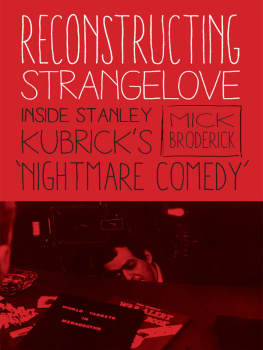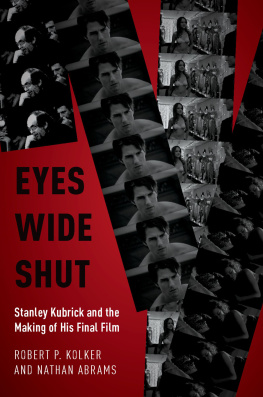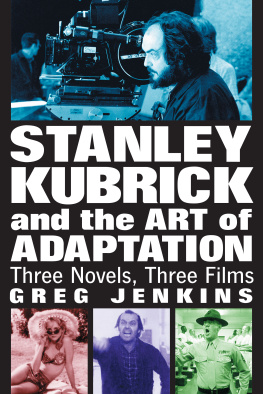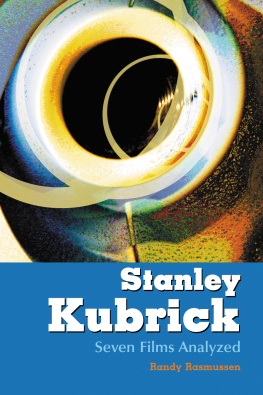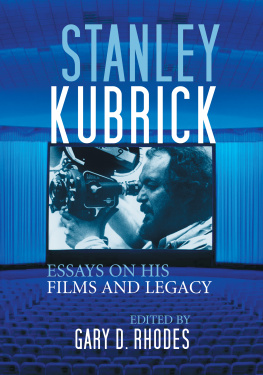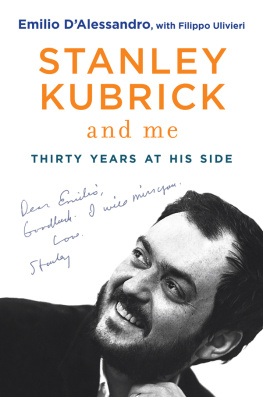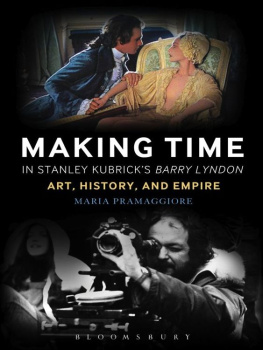Stanley Kubrick, Director
by Alexander Walker
Part I: From Fear and Desire to A Clockwork Orange
Man and Outlook
Only a few film directors possess a conceptual talent that is, a talent to crystallize every film they make into a cinematic concept. It is a skill that goes far beyond the mere photographing of a script, however cinematic the script may be in itself. It transcends the need to find a good subject, an absorbing story, or an extraordinary premise to build on. Essentially, it is the talent to construct a form that will exhibit the maker's vision in an unexpected way, often a way that seems to have been the only possible one when the film is finally finished. It is this conceptual talent that most strongly distinguished Stanley Kubrick.
But to say as much is only to restate the question this book seeks to answer: What is it that made Kubrick the kind of director he was? It even makes the task more difficult. Because almost every film Kubrick has directed has entailed constructing a new concept, he was a filmmaker who resisted the customary critical approach that tries to distinguish strongly linked themes in a director's work. It was wise even to avoid the head-on approach of question-and-answer with Stanley Kubrick. It was not one he readily submitted to or thrived on, for he knew the value of leaving the questioner, or viewer, unsatisfied, with an intensified curiosity about the complex forces shaping any action or individual.
Kubrick himself was a whole area of complex forces. Each film was a way of exploring the number of exciting possibilities it held for him at the time he decided to make it. Each film enabled him to extend his own investigation of himself by exhausting the area of research it opened up to his artistic and scientific imagination. This alone is one good reason why he was incapable of repeating a subject: it would mean repeating himself. And he simply did not have the time or the patience for that. Thus he was freed from the deadening demands that the film industry invariably makes on its most successful directors, or at least he did not give in to the demands when they were made.
Few directors have a temperament as strongly constituted as Kubrick's was to survive and create inside the industry without letting its enormous pressures rob him of his independence or impair his judgment. "Inside" is the key word here. If Kubrick kept himself to himself and he increasingly did just that, making him one of the most elusive of filmmakers it is not because he had any need to fear the kind of "punishment" that the movie industry still metes out even in these days, when directors have more creative freedom than ever before, to those who flout commercial imperatives in their pursuit of self-expression. Kubrick knew the laws that govern success or failure in this kind of world. He worked within them. As Hollis Alpert once put it, "He does not believe in biting the hand that might strangle him." Yet the fact remains that he succeeded in reconciling his own uncompromising requirements with those of the industry. On the strength of some dozen films, he has won a reputation for originality of subject and treatment that is rare among international film directors.
As well as his independence he kept his unpredictability. Each of his films, with only one exception, which he later disowned as not being "his" film, is stamped by its maker's evolving confidence in his own skill and by his curiosity in seeing how far he could extend it. He has always forced his reach to exceed his grasp. Other directors can justifiably boast of never underestimating their public. Kubrick's was a more characteristically private resolve: he never underestimated himself.
Such a man takes and gives immense pains in carrying out a resolve like this. To be part of his team was to surrender a part of one's life in a very real sense. Self-discipline in this kind of director demands a degree of despotism basically benevolent, yet ruthless in never allowing anyone or anything to jeopardize the work of constructing a movie in his own image of it. His immense energy recharged itself on work. Beyond a certain amount of well-being and physical comfort, the customary social pressures or diversions outside work simply did not impinge on his creative priorities. In recent years he grew a ruff of black beard that added a visible dimension of inscrutability to a disposition whose self-sufficiency seemed at times almost monastic.
His curiosity about the world was unflagging; the capacity of a friend or associate to satisfy it was often less so. His conversation was endlessly interrogative. This was sometimes abrupt and disconcerting when rapid-fire questions pushed one up against the wall of one's own inability to come out with satisfying answers.
In part, Kubrick's insistence on tapping one's thoughts, on eliciting responses, was connected with an interest in communication that intensified over the years, until it occupied a major part of his life and, as we shall see, formed the central concern in several of his films. Communicating with Kubrick was a kind of "debriefing" the military term is quite appropriate for his need to inform himself fully before he made decisions was obsessive. It follows that his range of interests was vast. An evening's conversation with him could cover such areas as optical perception in relation to man's survival; the phenomenon of phosphenes (or "lights behind the eyes") and its connection with the "Star Ride" sequence in 2001: A Space Odyssey ; German thoroughness in building flash screens onto their coastal gun emplacements in Normandy so that the cannon fire would not be pinpointed by the enemy; compromised safety margins in commercial flying (Kubrick, a resolute nonflier, had been monitoring control-tower conversation at a nearby international airport); Dr. Goebbels' role as a pioneer film publicist; the Right's inability to produce dialecticians to match the Left's; Legion of Decency pressures during the making of Lolita; SAM-3 missiles in the Arab-Israeli conflict; Irish politics and the possibility of similarities in the voiceprints of demagogues; and, of course, Kubrick's favorite game, chess.
Chess was the first of two lifelong obsessions he acquired from his father, a physician practicing in the Bronx, New York, where Kubrick was born in 1928. The second was photography. In Kubrick's case, there appears to be a very strong creative link between chess and the camera one is a mental discipline, the other an imaginative craft.
Chess in particular offers a clue to the elements that constitute Kubrick and helps to explain why he made certain films and not others and why he made them in certain ways and not in others. For the thought that goes into moviemaking, both in the physical preparation of a production and in the conceptual structuring of the film, was closely related in the case of this director to the attitudes that chess playing develops.
"If chess has any relationship to filmmaking," Kubrick said, "it would be in the way it helps you develop patience and discipline in choosing between alternatives at a time when an impulsive decision seems very attractive. Otherwise it is necessary to have perfect intuition and this is something very dangerous for an artist to rely on." It is hard to find the right criteria for making the dozens of decisions daily facing a director when they appear to have only small pluses or minuses attached to them. But the pondering of the choices, as in chess, enabled him, perhaps, to make more good ones than if he had impulsively reached for the first one that looked interesting.
Chess also sharpens one's awareness of the time factor. In tournament chess, a level Kubrick attained but stopped at, unwilling to make the total commitment required by serious championship play, the players are matched against a clock as well as against each other. There is a clear analogy between this rigorous framework and a film's budget and schedule, which relate to the time it will take to shoot. "You have a problem of allocating your resources of time and money in making a film, and you are constantly having to do a kind of artistic cost-effectiveness of all the scenes in the film against the budget and time remaining," Kubrick said. "This is not wholly unlike some of the thinking that goes into a chess game." The chessboard finds its way into scenes in several Kubrick films; and the narratives of The Killing and Dr. Strangelove are structured around the race against time and the consequences of "moves" made by the characters or by objects virtually independent of the characters. But whether there is this kind of internal evidence or not in a Kubrick film, its whole feeling suggests it has been shaped by a particular kind of mind, intuitively aware of choice, consequences, and the pattern of play and chess has been a part of this conditioning discipline.


